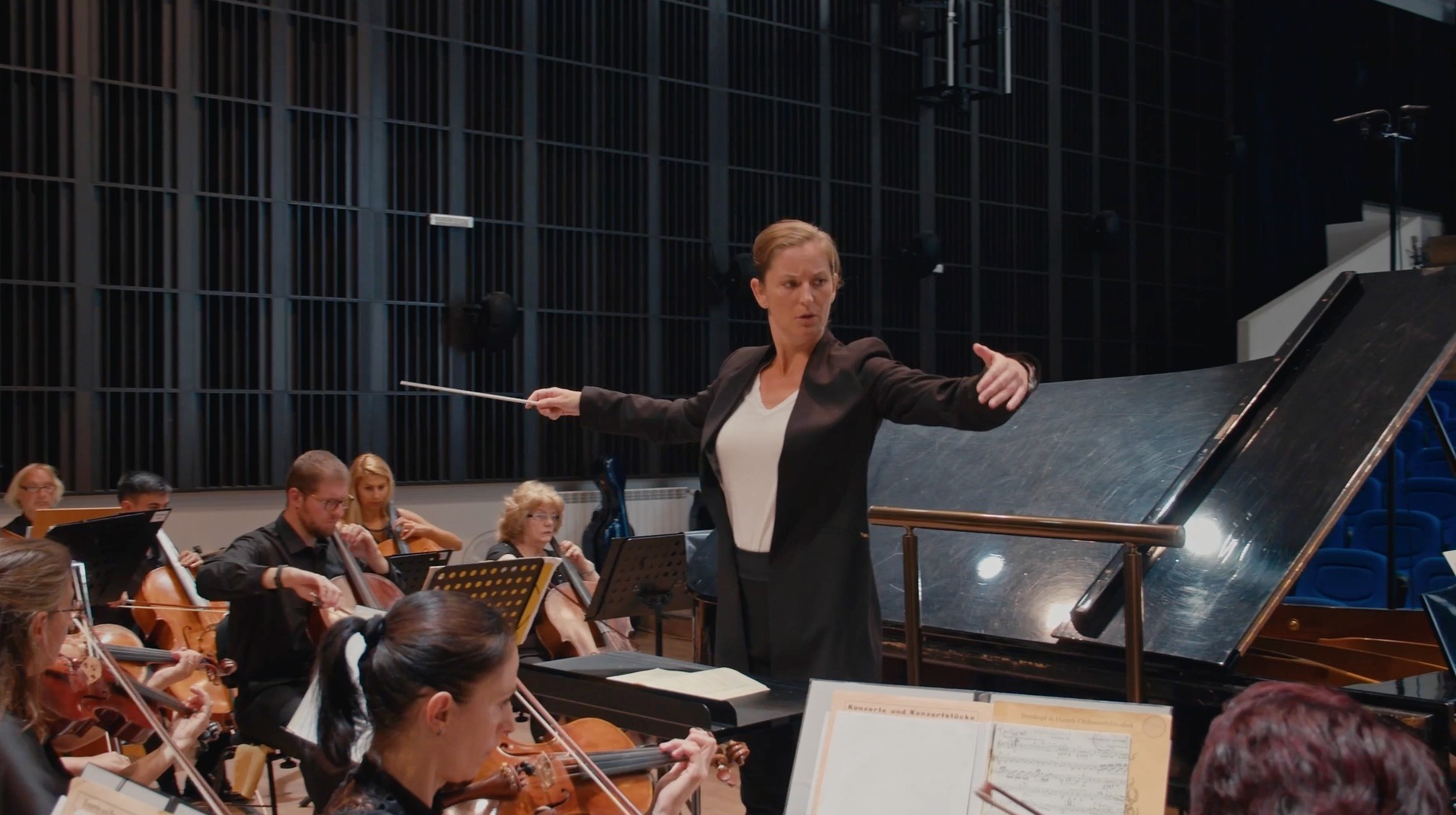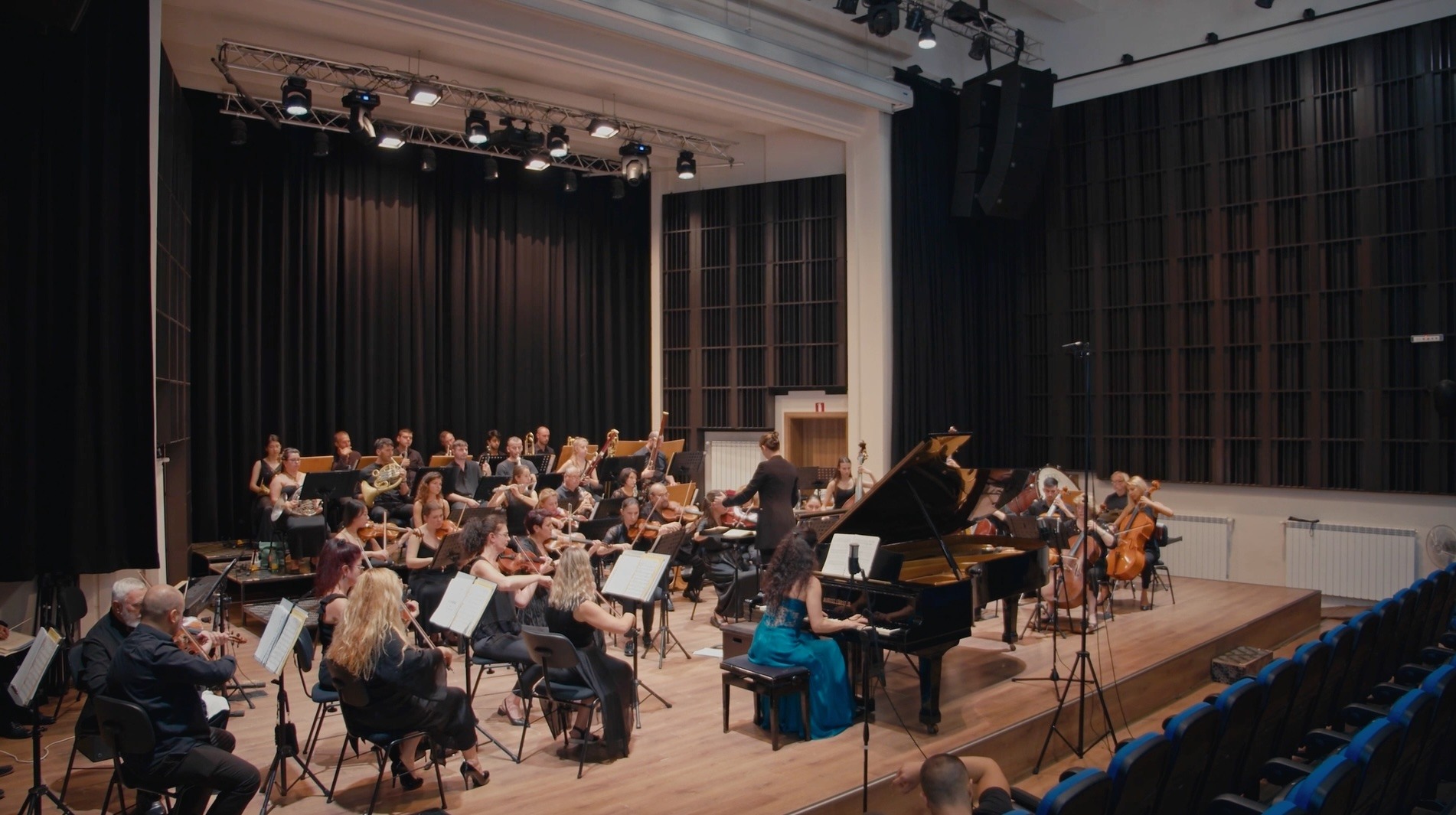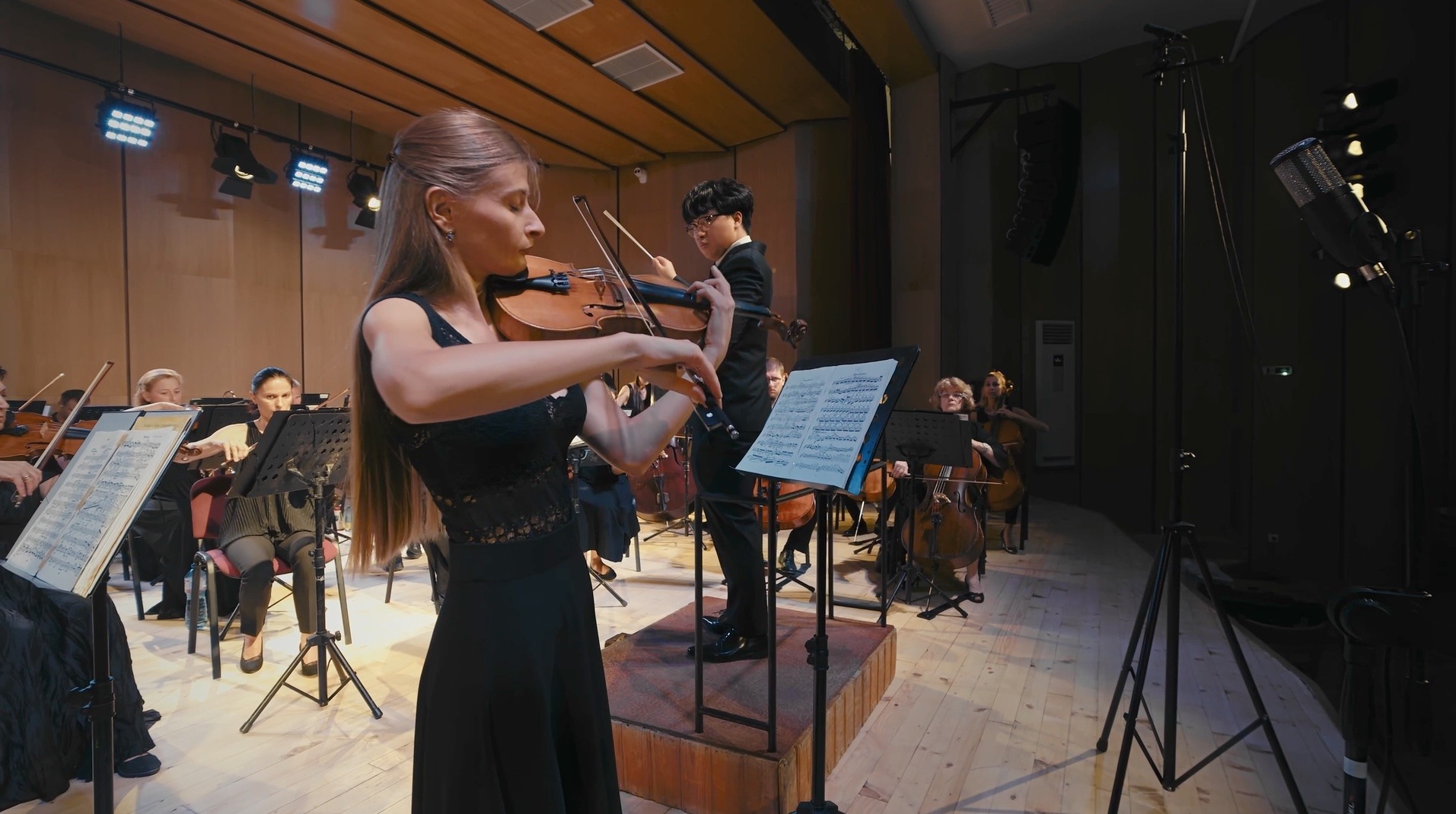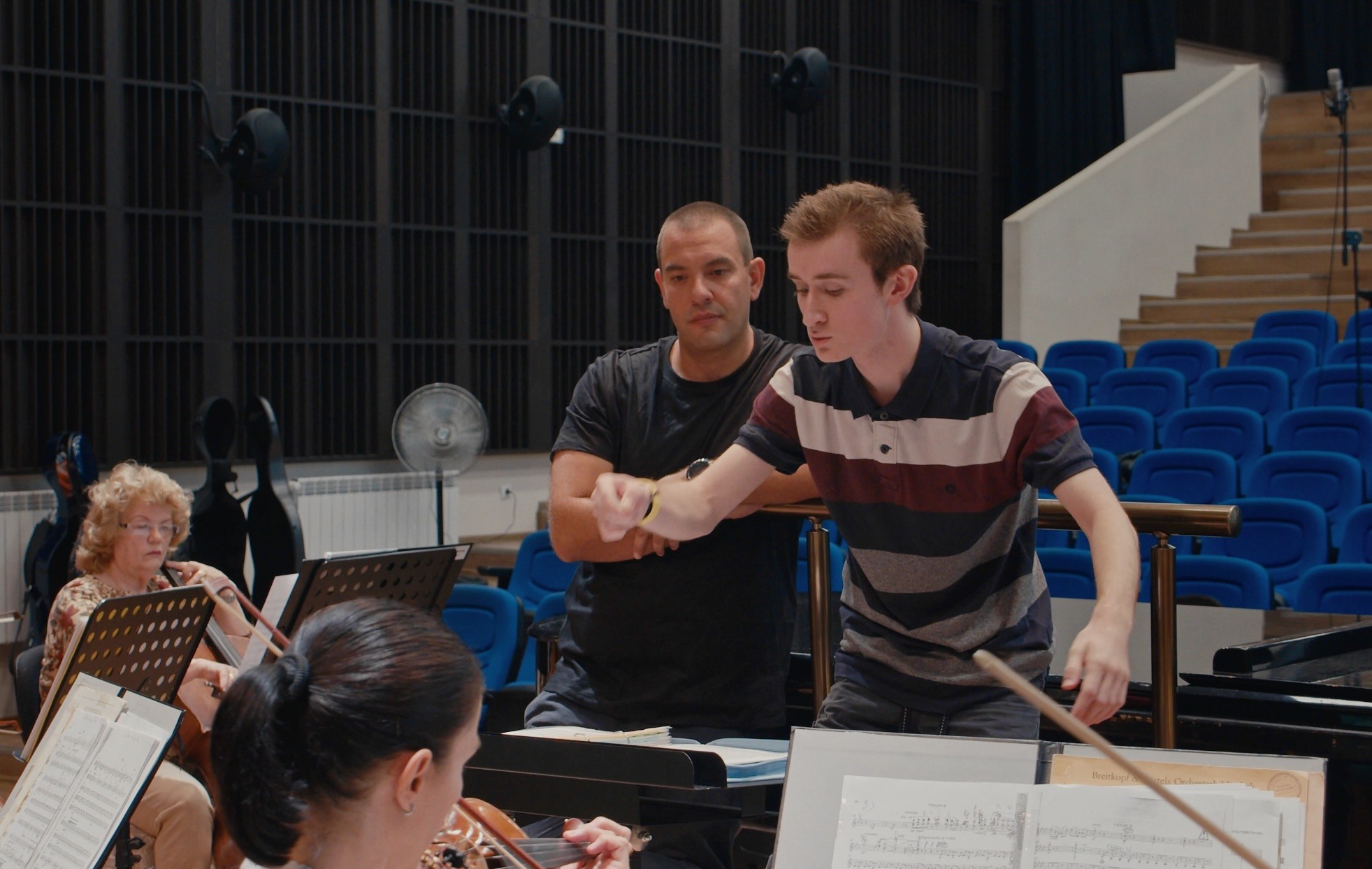Weekly Podium Time
Conducting can only be learned, not taught, so it’s essential to have regular podium time. You must put theory into practice to understand how your direction affects a professional orchestra. Additionally, while basic conducting technique remains relatively universal, the meaning and effectiveness of specific gestures will vary from conductor to conductor; each conductor developing their own style which is most effective for their body and personality.

How does it work?
Most modules offer a unique 30 minutes of podium time with professional ensembles. Each week, you will work through the repertoire studied in class, beginning with piano reductions. Then, you'll have periodic one-on-one sessions each module with your module leader to refine your skills.
Finally, the highlight – conducting the ensemble yourself for an average of 30 minutes at the end of most weeks (When the practical modules take place)! With your module leader and the rest of the team by your side, you'll get immediate feedback and practical experience that can't be beaten. It's an opportunity to learn and grow as a conductor, week in and week out.
Frequency and duration
Podium time is organised into 2 four-hour blocks over two days with breaks in between. All students will take part in both days. During this time, you also have the opportunity to observe your classmates, learn from the production team and faculty, and gain insights into the behind-the-scenes workings of a musical performance.

About the Vratsa Symphony Orchestra
Founded in 1931, the Vratsa Symphony Orchestra has become one of Bulgaria’s leading professional orchestras. The orchestra, at full strength, comprises approx. 50 players and is a resident at the Vratsa Municipal Hall in Vratsa, Bulgaria. The repertoire comprises traditional mainstream concert repertoire as well as championing new works by contemporary composers. Many of the section players also perform with the European Recording Orchestra and are featured on many film and television soundtracks.
Settings and Venues
- Vratsa Municipal Hall
- TCI Academy
- Doli Media Studios


Supervision and Feedback
Podium time is guided by a faculty member specialising in the relevant field. Students will receive on-the-spot feedback from lecturers regarding the effectiveness of their communication with the orchestra and how well the orchestra responded to their direction. Students will also receive immediate feedback regarding improvements to their performance and specific areas of focus for their next orchestral session. To further enhance learning, all rehearsals will be filmed and made available for later independent and guided review.
- Podium time includes (where relevant) a full symphony orchestra and soloists, singers, dancers, and a rock band/big band.
- Final sessions of each module include sound engineers and videographers.
Podium Session Outline:
- Module 1: 8 orchestral sessions, 8 piano sessions
- Module 2: 6 Orchestral sessions
- Module 3: 6 Orchestral sessions, 4 piano sessions
- Module 4: Career development (Vienna - Airfare and accommodation included in your tuition)
- Module 5: Media recording, editing and mixing (Sofia)
- Module 6: 5 Orchestral sessions and 5 piano sessions
- Module 7: 4 Ensemble sessions and 4 choir sessions
- Module 8: 3 Big Band sessions
- Module 9: 8 Orchestral Sessions and 12 piano sessions with soloists
- Module 10: Final concerts (Orchestral major projects) with Orchestra
Repertoire Selection and Preparation:
Preparation for orchestral rehearsals includes time in class focusing on score analysis and effective stick technique and gesture.
Module 1: Fundamentals of Symphonic Conducting Technique
- Mozart - Symphony 35
- Beethoven - Symphony 1
- Mendelssohn - Hebrides Overture
- Weber - Euryanthe Overture
- Brahms - Symphony 2
- Dvorak - Symphony 9
- Stravinsky - Rite of Spring
- Stravinsky - Soldier’s Tale
Module 3: Concerto Conducting
- Beethoven - Piano Concerto no. 3
- Mendelssohn - Violin concerto
Module 9: Opera
- Bizet - Carmen
- Verdi- Rigoletto
- Mozart - Don Giovanni
Have questions about this programme?
Speak with our Admissions Department. Submit our enquiry form to receive personalised answers to your questions.
Additional Information: Master of Fine Arts
Tuition and Fees
Total Course Tuition: €34,250
Payment Schedule
Program Deposit: €2,000 (Due to enroll)
Tuition Downpayment: €5,000 (Due June 1, 2025)
Payment 1: €9,250 (Due September 1, 2025)
Payment 2: €9,000 (Due December 1, 2025)
Payment 3: €9,000 (Due March 1, 2026)
Be sure to check out the "Costs of Living in Sofia" dropdown to see how much more affordable Sofia is compared to other major European and American cities.
Financial Aid
Students from the United States can take advantage of the FAFSA Federal Student Aid program. For more information, visit https://studentaid.gov/h/apply-for-aid/fafsa
More Financial Aid Programs:
All students searching for scholarships should search this website: https://www.wemakescholars.com
Norway: Lanekassen - https://www.lanekassen.no/
Colombia: Colfuturo - https://www.colfuturo.org/
South Africa: National Film and Television Foundation (NFVF) - https://www.nfvf.co.za/home/
South Africa: Oppenheimer Trust - https://www.omt.org.za/
Application Requirements:
Required documents to submit an application:
-
video examples of you conducting three (3) different pieces of contrasting styles (these need to be uploaded to a video streaming service such as YouTube or Vimeo so that you can insert links into your application for the Admissions Board to view)
-
1-page Letter of Interest, detailing why you are a viable candidate to be considered by the Admissions Board for the MFA Program
-
copies (Image or PDF) of any music degrees / certifications you have earned
-
CV / Resume (PDF format)
Academic Calendar
Two semesters of course work with a third semester dedicated to the Major Project.
2025-2026 Academic Calendar
Semester 1 - Full-time, presence in Sofia required
Sept. 15, 2025 - Semester 1 commences
Nov. 27 - Thanksgiving Holiday
Dec. 19 - Final day of classes
Dec. 22 - Winter break
Semester 2 - Full-time, presence in Sofia required
Jan. 12, 2026 - Semester 2 commences
May 29 - Final day of classes
May 31 - Semester 2 ends
Semester 3 - Presence in Sofia Optional
June 1, 2026 - Semester 3 commences
Aug. 31 - Semester 3 ends
Costs of Living in Bulgaria
Costs of living in Bulgaria are extremely low in comparison to other major European and American cities. Exponentially cheaper than LA, NYC, London, Valencia, or Boston, while maintaining an extremely comfortable standard of living.
Sofia, Bulgaria compared to other cities that house Conducting Masters degrees:
- 73% lower than New York City
- 65% lower than London
- 64% lower than Los Angeles
- 66% lower than Boston
- 30% lower than Valencia
For more information on comparing prices between cities, visit www.numbeo.com
The Conducting Institute will have a team ready to help students find accommodation in the city centre.
MFA Students who wish to live together will be able to find shared accommodation for as low as €150 - €200 per month.
MFA Students who wish to live alone will be able to find accommodation for as low as €350 - €400 per month.
Visa Requirements
Accepted students from the EU do not need a Visa. They will simply need to establish residency upon arrival in Sofia, which our team will assist with.
Accepted students from outside the EU will require a Type-D Student Visa. Assistance on this process will be provided by our Visa Officer after a student officially enrolls. It is advisable that accepted students from outside the EU begin preparing the Student Visa requirements listed on the Bulgarian Embassy website in their country as soon as possible, as this process can take a substantial amount of time.